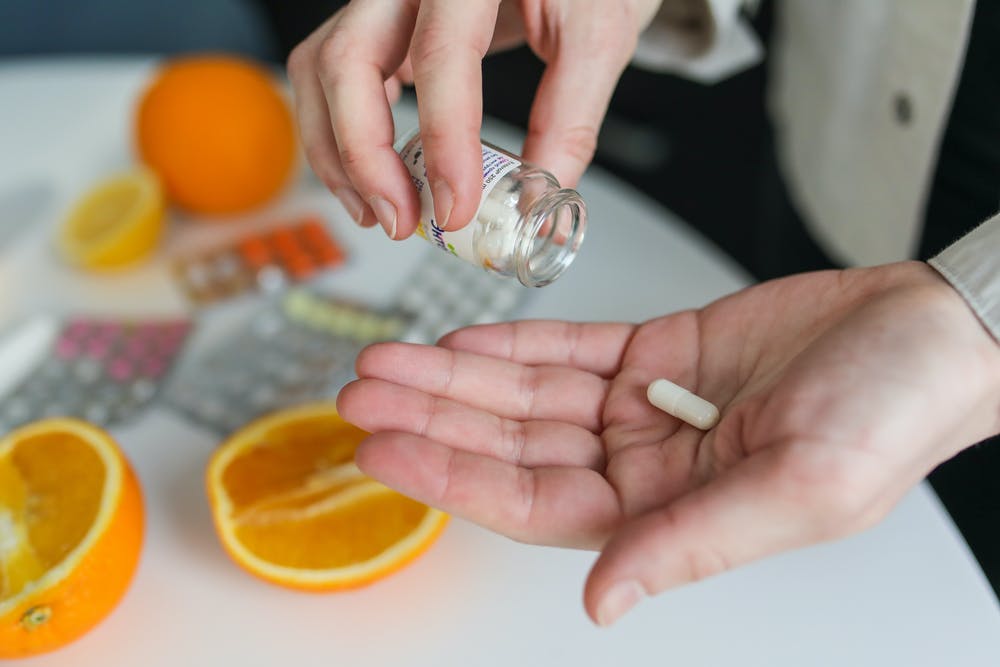
We tend to take a food first approach to optimising your lifestyle for fertility here at Foodbaby. But we still believe that prenatal vitamin supplementation plays an important role in getting your body baby ready.
And it’s impossible to talk about fertility supplements without starting with folate, the MVP of prenatal vitamins.
Folate: The Basics
Folate is a B vitamin, also known as B9. It is an essential nutrient needed to make DNA, for cell division and for methylation, changing the activity of genes and activating reactions in the body.
Obviously making DNA and new cells is vitally important in pregnancy, particularly very early on as your baby starts out as just a few cells that rapidly divide and multiply.
The main reason it’s so well known as a prenatal vitamin is that there is very strong evidence that taking it prior to and in pregnancy prevents neural tube defects. Supplements have been shown to be safe and may have other benefits including improving the chances of conception.
It’s recommended that you start folate supplements at least one to three months before starting to try to conceive, even if you’re not taking any other prenatal vitamin.
Neural Tube Defects
The neural tube is the structure that forms the brain and spinal cord and develops early in pregnancy (before week 13). If the neural tube develops abnormally, defects such as spina bifida (where parts of the spine develops abnormally) and anencephaly (where the brain develops abnormally) can occur. Neural tube defects often lead to miscarriage.
Folate supplements have been shown to reduce the risk of neural tube defects by a huge 50 to 70% if taken one to three months before conception through until the end of the first trimester.
Folate in Food
In general, we recommend people get most of their nutrients from food rather than supplements. However, research shows that most women of childbearing age don’t get enough folate from their diet alone.
Because of this, and the fact that around half of pregnancies are unplanned, food supplies in many countries are fortified with folic acid. Having some folate fortified food is great but it’s actually still not likely to be enough. So we recommend having a supplement too. But of course that doesn’t mean you shouldn’t be also be getting folate from food!
Good sources of folate include:
Leafy Greens: spinach, broccoli, chinese cabbage, asparagus
Legumes: soy beans, chickpeas, kidney beans, lentils, peanuts
As well as beetroot, turnip and avocado
In Australia all packaged bread products must be fortified, however this does not include organic or bakery-made bread. In other countries, pasta and breakfast cereals are also fortified.

Cooking
How you cook and store food can affect the amount of nutrients in it, including folate. One study found that canning food reduced its folate by about 77% so try to choose dried legumes rather than canned if possible (this will help decrease BPA exposure too.)
Boiling also reduces folate but steaming and microwaving caused very little loss. Steaming and microwaving preserve most other nutrients too, so this is a great way to cook.
How Much Folate Do You Need?
The Recommended Dietary Intake for folate is:
400 µg/day women
600 µg/day pregnancy
For women trying to conceive, supplements of 400- 800 μg/day are recommended. Standard prenatal vitamin combination will contain at least this much.
Higher doses may be indicated for those with a family history of neural tube defects, diabetes, digestive disorders (including Coeliac disease and Crohn’s), BMI>35 and those on epilepsy medication and smokers. Talk to your health professionals about what dose is right for you.
If you’ve heard about different types of folate and aren’t sure which you should take, you can read our article on folate vs folic acid.
Are There Any Risks Taking Folate Supplements?
It’s always important to think about the pros and cons of taking a supplement, including a prenatal vitamin, no matter how common it is. In the case of folate though, extensive research has found that folate supplementation is very safe. However, high doses of folate should be reduced or stopped after the end of the first trimester.
One study (on the Boston birth cohort) found that high levels of folate in the blood are associated with increased autism, asthma and tongue tie. This is just one study but it’s important to consider. Testing folate levels during pregnancy is recommended to detect both too high or low levels.
Lastly, it’s possible for folate supplementation to mask B12 deficiency (which is quite rare, especially for those in those who eat animal products.) B12 should be tested before supplementation or else taken with folate to prevent deficiency. If you get preconception blood work done it’s likely this will include both B12 and folate.

When to Start Supplements
As early as possible! Ideally, one to three months before starting to try to conceive.
You can read about how folate might help fertility here.
back to top
Foodbaby WAS FOUNDED on Kulin Nation land. We acknowledge the Wurundjeri people, Indigenous Australians, who are the Traditional Custodians of this land. We pay our respects to all Aboriginal and Torres Strait Islander Peoples and their Elders past, present and emerging.
Fertility dietitian, cycles nerd, lover of food and squishy newborn baby cuddles. I help people get pregnant (fast) and have the healthiest pregnancies possible.
Hey, I'm Ami
@foodbabyfertility